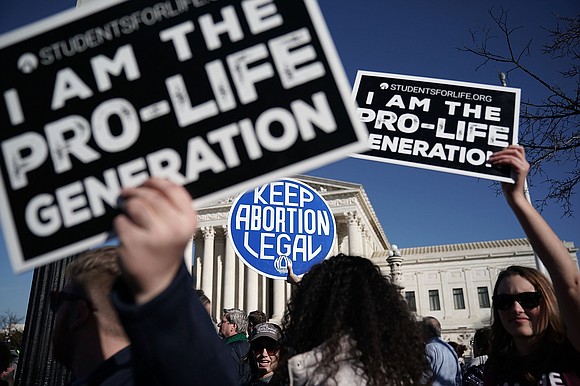Roe v. Wade once again finds itself at the center of Supreme Court nomination fight
CNN/Stylemagazine.com Newswire | 7/3/2018, 8:19 a.m.

By Ariane de Vogue, CNN Supreme Court Reporter
(CNN) -- Roe v. Wade, the landmark opinion that legalized abortion, has always had one very unlikely critic: Justice Ruth Bader Ginsburg.
In appearances over the years she has said that the opinion -- decided before she reached the bench -- went too far too fast.
Instead of sticking with the extreme Texas law at issue in the case, the Supreme Court issued a sweeping opinion in 1973 that called into question statutes in every state.
Ginsburg, who before taking the bench dedicated her career to gender equality, wrote in a 1985 law review article that the "sweep and detail" of the opinion would stimulate "the mobilization of a right-to-life movement."
She got that right.
Now, some 45 years later, the opinion will undoubtedly play a central role in the hearings for President Donald Trump's second Supreme Court nominee. The President himself triggered the debate by promising the "judges will be pro-life" in a 2016 interview on CBS.
As he interviews potential candidates behind closed doors, the debate over the landmark opinion rages on.
Liberals are trying to peel off the votes of Republican senators who support abortion rights. They are demanding that senators look past a nominee's vague statements about the respect for court precedent.
Conservatives, on the other hand, particularly those who oppose abortion rights, want reassurances from the White House that they are getting the best pick possible. And they have only days until the rollout next Monday to make sure.
As things stand, two top candidates are Judges Brett Kavanaugh and Amy Coney Barrett, according to sources familiar. Shortlists change, however. Neil Gorsuch was not the immediate favorite last time around. An initial front-runner was William H. Pryor Jr., a judge on the 11th US Circuit Court of Appeals. But Pryor had called Roe an "abomination" and declined to back away from the statement at his confirmation hearing. He ultimately never got an audience with the President.
Last weekend, Sen. Susan Collins, a Maine Republican who's a supporter of abortion rights, told CNN's Jake Tapper that she would not "support a nominee who demonstrated hostility to Roe v. Wade because that would mean to me that their judicial philosophy did not include a respect for established decisions, established law."
Under Collins' rules, Pryor would be a no go.
But liberals say senators should not disregard a nominee's record just because they've expressed an appreciation for court precedent.
"Hostility to Roe cannot be the standard," said Chris Kang of the liberal group Demand Justice. He noted that "very few judges who would overturn Roe" would publicly "come right out and say that."
"Instead, they vote to uphold every anti-abortion law they can and leave breadcrumbs in their writings about precedent," he said.
Kang points to concerns with Barrett's scholarship concerning precedent.
"The question remains whether overruling precedent affects the Court's actual legitimacy," Barrett wrote for the Texas Law Review in 2013.
"Does the Court act lawlessly -- or at least questionably -- when it overrules precedent? I tend to agree with those who say that a justice's duty is to the Constitution and that it is thus more legitimate for her to enforce her best understanding of the Constitution rather than a precedent she thinks clearly in conflict with it," Barrett wrote.
Kang fears that is a signal that Barrett would strike Roe.
In another article, however, written for Notre Dame Magazine in 2013, Barrett, then a professor at the school, said she believed it "very unlikely" that the court would ever overturn Roe.
As liberals are devastated by the retirement of Justice Anthony Kennedy, conservatives are delighted.
Critics of abortion rights have remained largely silent on the President's potential pick. Catherine Glenn Foster, the president and CEO of Americans United for Life, issued a statement on Monday calling a choice between Kavanaugh and Barrett a "good problem" since both, she said, "are committed constitutionalists."
But a source who opposes abortion rights who was willing to speak only on background said Barrett should be the top pick. The source said concerns had been expressed privately with the White House about a case Kavanaugh recently decided concerning an undocumented teen in US custody who sought an abortion. Ultimately, Kavanaugh's court voted in favor of the teen and he dissented. But some said his dissent should have gone further.
That confuses his supporters, including one who said on background that Kavanaugh's dissent was vigorous and had adopted all of the Trump administration's arguments that had been presented in the case.
"In any other circumstance the opinion would have been hailed as a solid and comprehensive opinion, and the only reason that is not happening here is because people are trying to find any daylight they can to criticize his record," the source said.
"It's not there," the source added.
As for the President, he has said he won't ask a nominee for his or her views on the subject.
"As the President said last week, he's not going to talk to judges about specific cases, he's looking for individuals that have the right intellect, the right temperament and will uphold the Constitution," White House press secretary Sarah Sanders said Monday.



